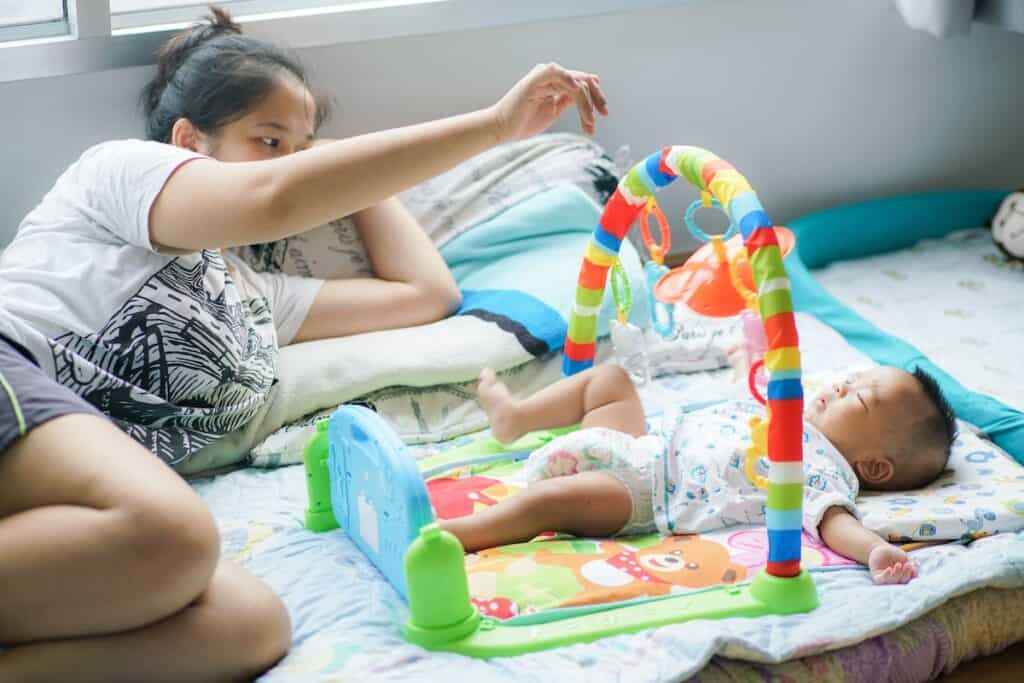What Singaporean Parents Complain about Domestic Helpers in Baby Care
The relationship between Singaporean parents and domestic helpers who take care of babies is a mix of trust and dependence. Many families rely on these helpers to provide support during the most critical period of their child’s life. However, this setup can be complicated by many issues.
Understanding what Singapore parents complain about domestic helpers is key to a good caregiver-parent relationship. Knowing these issues will help both parties to address conflicts and communicate better so that the children get the best care.
Here are some of the common complaints:
- Safety and Trust: Fear of abuse.
- Lack of Childcare Skills: Different levels of infant care knowledge.
- Phone Usage During Work: Distractions while supervising.
- Poor Time Management: Neglecting immediate childcare needs.
This article will go into each of these complaints and more, with views from parents and helpers. We hope to equip parents to navigate their caregiving journey.

1. Safety and Trust
Parents have many fears about their children being mistreated by domestic helpers. Child safety concerns arise from real life incidents caught on camera, showing rough handling or verbal abuse. Such incidents can break trust and create anxiety for parents who rely on these caregivers.
Trustworthiness is key to a peaceful caregiving setup. Parents need to feel secure that their children are in good hands, while helpers need to understand their role in building that trust. Open communication and consistent monitoring can bridge the gap, for a win-win situation for both.
2. Lack of Childcare Skills
Many domestic helpers come from backgrounds where managing multiple tasks like cooking, cleaning and taking care of children is not common. Because of this lack of experience, they may have gaps in childcare skills.
- Training programs that focus on infant care techniques can fill this gap.
- There is a big difference in skills among helpers, especially when it comes to interacting with children beyond their usual duties.
Parents look for caregivers who can offer more than just basic care—someone who can also engage their little ones mentally and actively. By addressing these skill differences, we can improve the caregiving experience and create a loving environment for the children.
3. Phone Usage During Work
Phone usage among domestic helpers is a big concern for Singaporean parents. Many have seen helpers distracted by their phones while on duty. Here are some common scenarios:
- Supervising a sleeping baby: A moment of distraction can be dangerous.
- Preparing food: Divided attention during meal prep can lead to accidents.
These distractions are serious safety concerns especially when caregivers are in charge of infants. This highlights the need for focused attention and engagement so the children get the care and supervision they need.
4. Poor Time Management
Time management is key to balancing household chores and attending to a child’s immediate needs. Some domestic helpers struggle to put childcare first, and parents have many concerns.
- Task Overload: Helpers may be overwhelmed by the many tasks including cleaning, cooking and taking care of the baby.
- Neglect Risks: When household chores take priority, child-focused activities like feeding or playing can be neglected. This neglect can affect the child’s well-being and development.
Parents get frustrated when they see their child’s needs not being met because of poor task prioritization, that’s why effective time management is key in caregiving roles.
5. Communication Issues
Language barriers can be a big challenge between Singaporean parents and their domestic helpers. Misunderstandings happen when helpers don’t fully understand specific childcare instructions.
- Common scenarios:
- Helpers not following feeding schedules.
- Misinterpretation of care routines like nap times or hygiene practices.
These can lead to inconsistencies in care that can compromise the baby’s well-being. Clear communication is key to creating a nurturing environment where both parents and helpers feel confident in their roles.
6. Stress Related Issues
Domestic helpers have a lot on their plate and can get stressed. Managing tasks like taking care of children, household chores and sometimes cooking can be overwhelming.
- Caregiver Burnout: This constant pressure can affect the quality of care.
- Impact on Children: In times of frustration, some helpers may unintentionally direct their stress to the children.
We need to address these stress management issues to maintain a loving environment. By understanding the struggles of helpers, parents can create better communication and support systems to improve caregiving.
7. Cultural Differences
Conflicts happen between Singaporean parents and their foreign domestic helpers due to cultural differences in childcare approaches. Different expectations of child-rearing practices can lead to misunderstandings and tension. For example, a helper might be used to different discipline methods or feeding routines that clash with the parents’ established norms.
This difference in practices can create friction as parents feel their values and expectations are not being respected. Open communication about these differences is key to aligning care practices and having a harmonious relationship between parents and helpers.
8. Lack of Initiative
Many Singaporean parents get frustrated when domestic helpers lack initiative. Helpers often wait for instructions instead of being proactive in caregiving. This dependence on guidance can lead to:
- Delay in attending to the baby’s needs
- Missing opportunities to do essential tasks like soothing a crying baby or preparing meals
In situations that require quick thinking like when the baby is upset or needs immediate attention, this passivity can be a problem. Encouraging initiative-taking can improve care quality and create a more harmonious relationship between parents and helpers.
9. Boundary Issues
Boundary issues happen when domestic helpers don’t respect parents’ authority in child-rearing decisions. This can be a big source of tension and frustration for Singaporean parents. For example, some helpers may make decisions on their own regarding feeding, discipline or daily routines without consulting the parents.
Key concerns:
- Authority Respect: Parents want caregivers to follow established guidelines while communicating openly.
- Decision-Making Conflicts: Disagreements happen when helpers go beyond their scope of responsibility and create an uncomfortable dynamic.
By addressing these boundary issues we can have healthier relationships and caregiving that aligns with parental expectations.
10. Inconsistent Care Standards
Parents complain that their domestic helpers don’t maintain consistent care standards for their babies, especially when they are away. This inconsistency can manifest in several areas:
- Feeding Schedules: Helpers may not follow the feeding times or quantities, resulting to irregular eating habits that can affect the baby’s health.
- Nap Times: Deviation from established nap routines can disrupt a baby’s sleep cycle and affect their overall mood and development.
- Hygiene Practices: Inconsistent hygiene practices like diaper changes and handwashing before meals can be a health risk to infants.
These gaps in care can cause anxiety for parents who rely on their helpers to provide a safe and loving environment. Setting clear expectations and regular communication can bridge the gap in care standards and ensure the baby gets consistent attention and support.
Better Relationships Between Parents and Domestic Helpers for Better Baby Care
Having strong relationships between Singaporean parents and their foreign domestic helpers is key to better childcare. Here are some tips:
1. Encourage Open Communication
Creating a communication-friendly environment can address concerns and clarify expectations. Parents should feel comfortable talking about specific needs, while helpers should share their thoughts.
2. Regular Check-ins
Having regular discussions can allow parents to give feedback and helpers to share their challenges. This creates a collaborative environment and reduces misunderstandings.
3. Training
Investing in training for helpers can improve their skills and confidence. Take some time each day to train them on childcare, safety protocols and cultural sensitivity the way you’d like it to be.
4. Set Expectations
Defining roles and responsibilities can reduce confusion. When both parties know what they are supposed to do, it creates accountability.
5. Show Appreciation
Recognizing helpers can boost morale. Verbal praise or small surprises can create a positive vibe.
By acknowledging the complaints of Singaporean parents about domestic helpers taking care of babies, we can take proactive steps to improve relationships. By improving relationships with helpers, we can have better baby care experiences, and everyone benefits.








